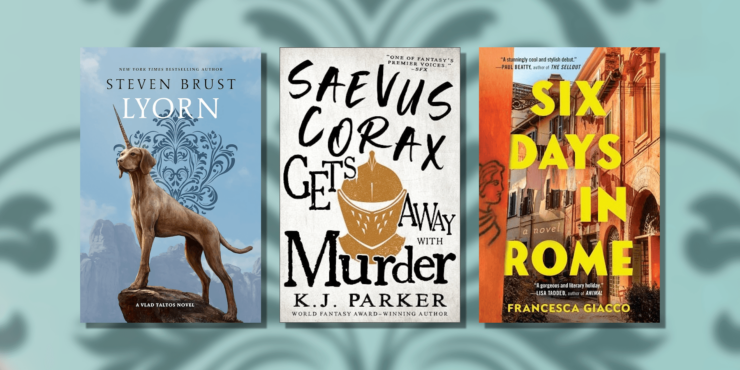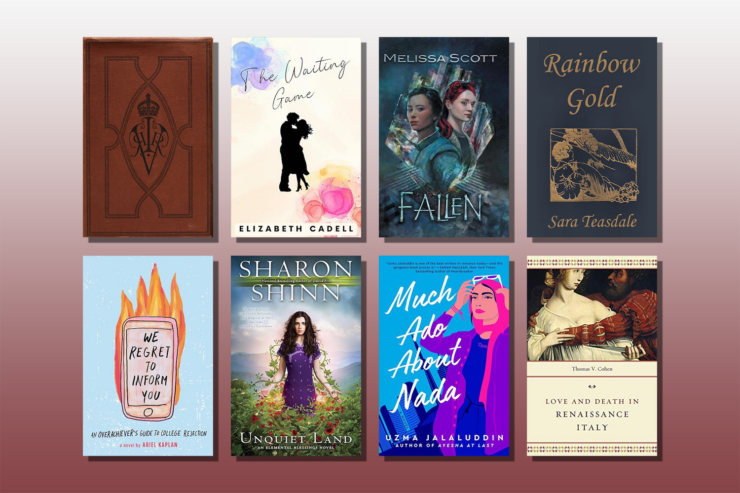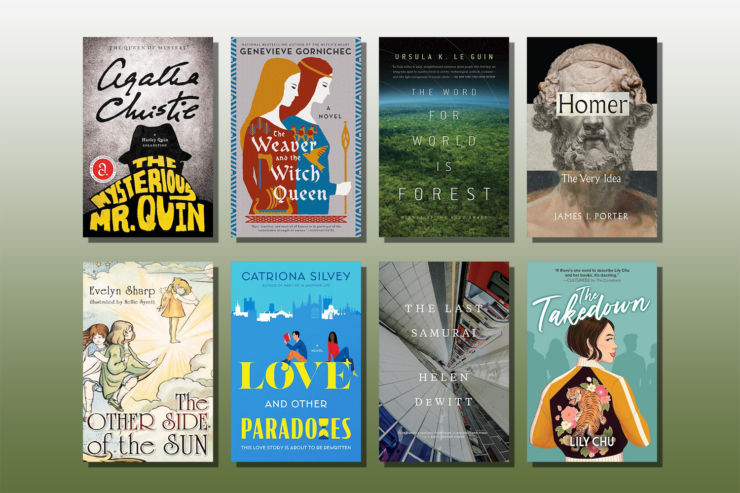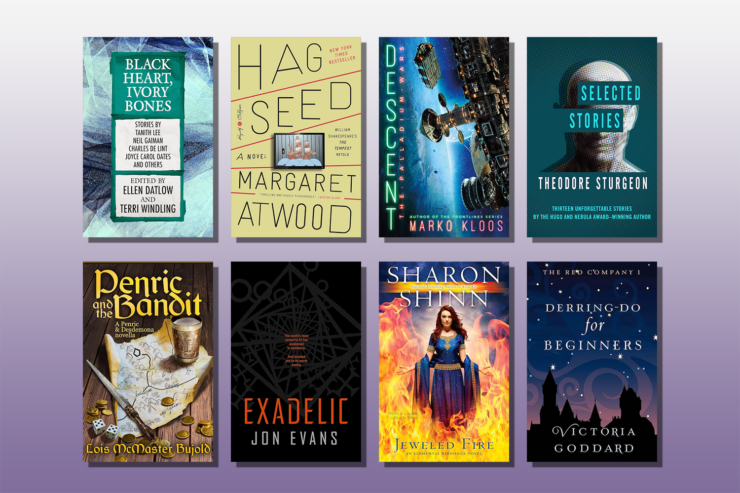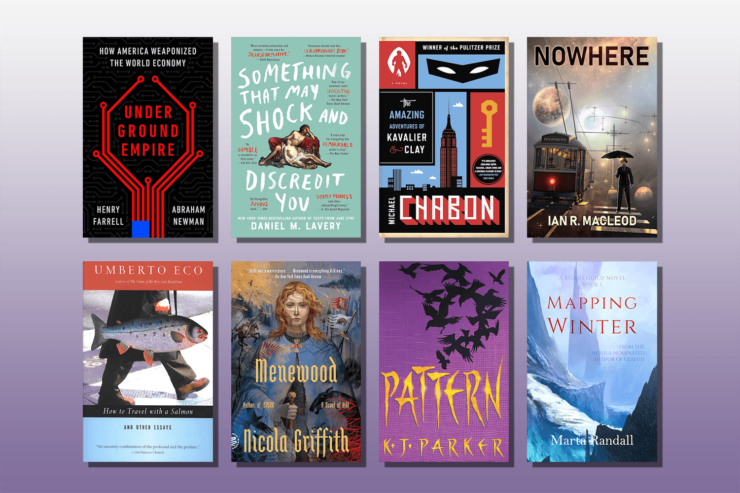Oh my goodness, 2024 already! I was home in December, writing, and over the holidays I had friends to stay in a Covid-cautious bubble that let me have fun and see people in a relatively safe way, though my son and other friends got sick—which meant that the present-opening part of Christmas got postponed several days after the traditional 25th. Stay safe out there.
I finished thirteen books in December, some of them great.
After Doomsday, Poul Anderson (1962)
Re-read, technically, but I hadn’t read it in decades and didn’t remember the details at all. This was a very traditional, or what one might call old-fashioned, science fiction novel, in which a returning interstellar exploration ship discovers Earth has been destroyed and has to find a way to survive among the aliens, while investigating how the destruction happened. Except there are two ships doing this, one US ship with an all-male crew and another European ship crewed entirely by women. (What? What? Why? Oh never mind.) It’s pretty obvious that they’re going to meet up and solve the mystery and that humanity will survive even though Earth didn’t.
There are neat aliens, and enough plot for a book (which would not be better) four times the length. I enjoyed reading it, while constantly holding it at arm’s length and marvelling at it— human exceptionalism, everyone unexaminedly white, aliens like specific historical societies. The axioms Anderson was bringing to it seem more alien than the aliens. Fascinating universe, though—nifty worldbuilding and use of a particular kind of FTL drive and a universe that is very, very big and very, very hospitable, so full of habitable worlds and aliens that the spheres of civilization clusters and trade languages are unimaginably huge and resources pretty much unlimited, and it really would be possible for the two surviving human ships never to run into each other again if they didn’t have (different) cunning plans. Poul Anderson had more ideas for great universes than any ten normal people, and he seldom reused them.
Pigeon Post, Arthur Ransome (1936)
Re-read, bath book. Next episode in the Swallows and Amazons books I’ve been slowly re-reading for a while now. I really love this one, with the perfectly set up misunderstanding and the failure that turns out to be a different kind of success, and all the children so well characterised and different from each other and appreciating each other. Pigeons! Drought! Searching for gold! Specific detail of exactly what they were doing! These are children’s books about children being independent, imaginative, and competent, in a very old-fashioned way. I don’t know how I’d feel about them if I encountered them now as something new.
Lorenzo de’ Medici and the Art of Magnificence, F.W. Kent (2004)
Terrific book about Lorenzo de’ Medici that absolutely assumes you’ve already read at least one other book about Lorenzo and you don’t need things spelled out. So not for beginners, but full of nifty and specific information about a complex person in a complex society, focusing on patronage and creation. Smoothly written and excellent, but very definitely an academic not a general book.
Lyorn, Steven Brust (2024)
It doesn’t come out until April, but I got an ARC. It’s interesting how immensely readable I find the Taltos books. Once I start reading one my eyes are glued to it, I don’t want to read anything else, or do anything else, I just want to read it all right now. It’s hard to say why, but they’re made out of pure I-want-to-read-it as far as I’m concerned. Last year’s Tsalmoth was set way back in the continuity. Lyorn is set further forward than anything we’ve yet seen. There is a theatre in Adrilankha, and a musical comedy, there is Vlad, there are lots of things that would be spoilers and that are part of the wider shape of plot that Brust has been giving us in jagged, angled mirror shards since 1982. There are only two books left. Do I see a satisfactory conclusion ahead? I believe it will all come together, but I’m damned if I can see how. Meanwhile, Lyorn isn’t a good place to start, but is a wonderful place to continue. Read them in publication order. More below.
Introducing Mr Winterbourne, Joanna Chambers (2014)
Very short Victorian gay romance that felt abrupt to the point of suddenly cutting off. This may have been intended to be a novella, but it doesn’t have novella pacing, it has novel pacing and then all wraps up in a few pages. I was enjoying it a lot, but felt so abandoned by it that I almost certainly won’t be reading the sequels, although the characters were charming and the… you don’t call it worldbuilding in a historical novel, but it is. It was good, anyway, much above average. It didn’t just cut off, which would have been irritating but fine—it tied everything up in record time. Oh well.
Saevus Corax Gets Away With Murder, K.J. Parker (2023)
Third in this trilogy, more of the same, unfortunately now with love. A perfectly adequate and indeed very good Parker.
So I was thinking, because I read this right after Lyorn, that I have raced through tons of Parker since I discovered him in 2020, and that if I hadn’t come to Brust until then I’d have raced through his work the same way… and then I stopped at this thought. Because I’d have raced through the Vlad books all right, but with so much more joy because unlike Parker they’re about something. They connect. There are things going on beyond just the momentary entertainment. I’d probably have read all of them three times. And that made me think about meta and connections and the thing Parker does where he gives things the same names but they’re different things, and my conviction that he is doing this just to mess with me because he not only doesn’t take me seriously, he kind of despises the whole human race. Whereas Brust is also writing a cynical first person narrative, but we see his cynical narrator growing up and learning better over the course of books that are not written in internal chronological order, and we see him learning about the complex metaphysical underpinnings of the universe he lives in.
There’s a thing that happens in the Corax trilogy and a secret of it is discovered in this book and well, whatever, OK, there we are then. But when something is revealed in the Vlad books, if it looks like a fluke, it’s part of a surfacing whale, and I can trust that the whale is down there and I can see the shadow of it. And I like that, I like doing that particular work as a reader. I get tired of things that are intended just purely as entertainment, when they’re not for anything, not in service of anything. I get tired of pure meta too, I want both the meta and the for. So that’s why I’m on Devera’s side even though I am well aware that there isn’t any Devera to lead it.
Six Days in Rome, Francesca Giacco (2022)
You think from the title that this is going to be a romance novel set in Italy? Nope, surprise, not a bit of it, it’s a literary novel set in Italy, and very well-written and good, as litfic goes, with very powerful descriptions of Rome and emotions. This is the tightly focused story of a young woman coming to terms with both a recent romantic disappointment and her relationship with her parents, and with her own creativity and how it intersects with those things, while wandering around in Rome.
The Two Mrs Abbotts, D.E. Stevenson (1943)
Sequel to Miss Buncle’s Book and Miss Buncle Married in which the characters from the previous two books find themselves surprised to be in 1943 and coping as best they can. This is funny and clever while being fairly slight, and was written before Stevenson had any idea of the shape or duration of the war. It’s interesting how differently the same events would be written about now through the clarity and blurring lenses of hindsight. Fun, readable, with many female characters of different ages. Even minor Stevenson is enjoyable to read. But read Miss Buncle’s Book.
Every Day in Tuscany, Frances Mayes (1998)
Sequel to Under the Tuscan Sun and not as good, but still readable and enjoyable memoir about living in Italy for a longer period and with some celebrity because of the earlier book. Some stuff about the painter Signorelli. Somewhat more self-conscious and less open than the earlier book. But excellent descriptions of cooking and eating and friendship. It’s hard to write this kind of book knowing the people in it will read it, and there’s a kind of holding back here which I think is because of that. There’s a lot of lovely stuff about her grandson—who must now be in his mid-twenties, and I wonder what he thinks about these cute anecdotes. Memoir is in a weird space, because other people are real, and honesty with the reader only goes so far—can, should, only go so far—into their privacy.
Everywhere: Collected Novellas and Short Fiction, Ian R. MacLeod (2019)
Ian MacLeod is one of the most powerful and inventive science fiction writers we have, and some of these stories are among the best things written this century. “New Light on the Drake Equation” would itself be worth the price of this volume. I’d read a lot of these before, some of them in Year’s Bests, some in magazines, some in earlier less comprehensive collections, but reading them all together here just blew me away. I don’t know whether it’s true that MacLeod has had less attention than I feel he deserves; he’s won the World Fantasy Award and the Clarke Award. In any case, he’s terrific, these long stories are terrific, he has a tremendous range, a great way with words and characters, and he’s extremely inventive. This collection gives interesting afterwords to all the stories. There’s another collection of shorter work called Nowhere which I have bought and will be reading soon.
Paradiso, Dante Alighieri (1321)
Still the Clive James translation. I still like it less than the Ciardi. However, still great. There’s so much going on here as Dante rises up through the layers of heaven and meets people who have made it there permanently who make pixel pictures for him. His use of metaphor and very specific reality next to each other to try to describe heaven is fascinating, and so different from Inferno. Paradiso has geography, but it’s also much more obviously metaphysical to a modern reader. Really nifty. I really do like the later volumes better than Inferno, even though Inferno is very good; it’s a rare example of a series that gets better as it goes on. This isn’t Dune—if you read Inferno and stopped, keep going!
A Lot Like Christmas, Connie Willis (2017)
Newish collection of Connie Willis Christmas stories, adding some to the collection Miracle which I’ve had for some time. So sort of a re-read, but a few were new. The best of these are stunning, the weak ones feel a little forced, and perhaps reading them all together doesn’t do them any favours. I’d been saving this to read in December, for obvious reasons, and it definitely worked for that, but maybe they’d work best if I read one every year. I wish “Epiphany” had an ending as wonderful as the beginning.
The Warrior’s Apprentice, Lois McMaster Bujold (1986)
Re-read, bath book. So, after jumping around in the series last month I decided to go back and read this sedately, which led to getting out of the cooling bathwater waterlogged and wrinkled more days than not—this is not an easy book to put down. The thing about Bujold getting better as she went on is that she started from a very high point, and this is already deeper and better than most space opera. This is the story of disabled Miles Vorkosigan, child of over-achieving parents on feudal Barrayar, and his adventures improvising a space mercenary fleet. He is the warrior’s apprentice as sorcerer’s apprentice, he doesn’t know how to stop doing the spiralling spell. Beautiful pacing, great characters, lots of action, and no easy answers. It contains spoilers for Shards of Honor but you can read them in either order.
Jo Walton is a science fiction and fantasy writer. She’s published two collections of Tor.com pieces, three poetry collections, a short story collection and fifteen novels, including the Hugo- and Nebula-winning Among Others. Her novel Lent was published by Tor in May 2019, and her most recent novel, Or What You Will, was released in July 2020. She reads a lot, and blogs about it here irregularly. She comes from Wales but lives in Montreal. She plans to live to be 99 and write a book every year.










